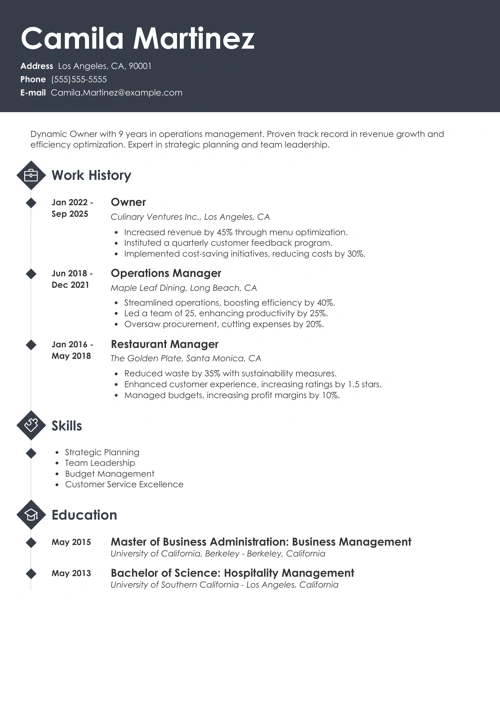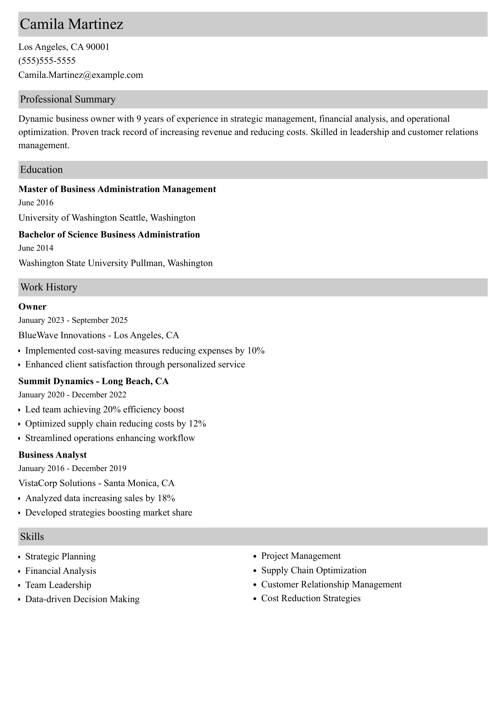What top management skills convince employers to hire someone?
I asked that question the executives who hire managers. Here’s a golden list of management skills, the top 10 skills managers want—plus 5 hidden skills executives fight for. Time to find out what they are.
This guide will show you:
- The 10 most common management skills examples.
- Five lesser-known but potent managerial skills execs can’t resist.
- How to know what manager skills a targeted company wants most.
- How to prove your management skills to employers so they’ll hire you.
Want to save time and have your resume ready in 5 minutes? Try our resume builder. It’s fast and easy to use. Plus, you’ll get ready-made content to add with one click. See 20+ resume templates and create your resume here.
Sample resume made with our builder—See more resume samples here.
1. Most Common Management Skills
Just need a quick list of managerial skills to peg your resume to the job?
We’ve got you covered. The manager skills list below shows the best hard skills and soft skills of a manager.
They make great resume keywords for managers too.
Management Skills List
- Analytical Thinking
- People Management
- Business Knowledge
- Leadership Skills
- Budgeting
- Communication Skills
- Hiring
- Interpersonal Skills
- Collaboration & Teamwork Skills
- Conceptual Thinking
- Finance
- Time Management
- Conflict Resolution
- Office Management
- Collaboration Skills
- Logistics
- Delegation
- Coaching
- Problem Solving
- Business Development
- Critical Thinking
- Negotiating
- Organization
- Planning
- Project Management
- Presenting Skills
- Technical Skills
- Administrative Skills
Here’s the shocker:
Listing manager skills on a resume won’t get the interview.
You need the specific few skills the employer thirsts for.
Then prove you’ve got them.
I’ll show how next.
Do you need help developing management skills? Online leadership training programs like eCornell and AMA courses can fast-track your talents. They’re no substitute for achievement, but they’ll help an entry-level manager stand out.
Managerial skills are vital for any leadership position. But there are other skills you need to pay attention to. We analyzed 11 million resumes made in our builder, and here are the top 10 most frequently added skills overall:
- Teamwork and Collaboration
- Problem-solving
- Excellent Communication
- Multitasking
- Attention to Detail
- MS Office
- Analytical and Critical Thinking
- Data Entry
- Project Management
- Team Management
Looking for more good management skills to put on a resume? Look at job offers online. Also, see our guide: 99 Key Skills for a Resume (Best List of Examples for All Types of Jobs)
To laser-in on hard managerial skills, see: Resume Hard Skills: Best Definition & Examples
For a list of transferable skills, see: Resume Soft Skills: Definition & Examples
2. Key Management Skills Examples
Queasy-stomach time:
You put 10 common management skills on your resume.
But so did everybody else!
You’re as generic as an off-the-rack suit. Don't list meaningless Microsoft Office skills or computer skills from the '80s.
You need to show you’re different and worth hiring.
I posed that question to Lucjan Samulowski.
His successful startup operates in seven countries and employs a team of 500.
He frequently hires managers. Yet he skips past thousands of “qualified” applicants.
His advice?
“The ‘management skills’ term is popular,” Lucjan says. “The right way to think about it is ‘management behaviors and abilities.’”
It all comes down to proving you know how to be a good manager.
These top five managerial skills fly under the radar:
-
Past Success
Got managerial achievements? Show them.
Past success means you can do it again in. That’s a green light for executives to hire you.
Can’t point to past success? Take heart. The other management qualities below can shine a spotlight on your hireability.

-
People Follow You
What’s the most valuable of all manager skills?
People management skills or interpersonal skills.
Psychologist Daniel Goleman calls interpersonal skills the strongest predictor of leadership success.
The best evidence? People follow you. Not on Facebook or LinkedIn, but in real life.

Pro Tip: What if you have no management experience but you want to prove potential? Demonstrate the three key manager skills below. “If I met a person like that in an interview,” Lucjan says, “I would not let her go.”
-
Have High Empathy
Next on our list of hidden but effective management skills is empathy.
Empathy is defined as “the ability to understand and share the feelings of another.”
That’s the secret sauce that makes employees want to succeed for you.
Empathy lets you see and provide for your employees’ needs––a one in ten-million motivator. Having high empathy means you understand your team’s work at ground-level. It means you possess a strong set of active listening skills.
“I worked with a director once who couldn’t gain the respect or command of his staff,” says Elle Torres, Senior Process Consultant at Blue Cross and Blue Shield. “He didn’t feel like he needed to know the details of their jobs. He just needed them to ‘do it better.’”
The director humbled himself and took a week to work alongside his frontline staff. This seemed like a waste of time. But the real waste was sitting in his office and remaining ineffective.
“You must acknowledge you don’t share the same expertise as your subordinates, regardless of your work title,” says Torres. Admit your team knows more than you, then allow them to teach you.
Show you’ve done that, and employers will fight over you.
-
Learn Fast
Today’s business world turns on a dime. Companies that seem rock-solid today may vanish tomorrow, while billion-dollar firms pop up overnight.
Executives prize the manager skills of quickly spotting and exploiting shifting tides.

-
Be Results-Driven
Does “results-oriented” belong on a managerial skills list?
We can debate that, but C-Suite leaders crave it like air.
Execs don’t have to tell a goal-oriented manager what to do. They can aim her at the target and walk.
Employees like results-driven managers because they understand the goal.
“Everyone wants to be part of a winning team,” says Lucjan.
Being results-driven means being accountable, too. “You shouldn’t be caught by surprise by anything your team delivers,” Torres says.
Pro Tip: Can you just say, “I’m a results-driven fast learner with high empathy” and get hired? Maybe in cartoons. In the real world, you must prove your business management skills. I’ll show how next.
Making a resume with our builder is incredibly simple. Follow our step-by-step guide, use ready-made content tailored to your job and have a resume ready in minutes.
When you’re done, our professional resume builder will score your resume and our ATS resume checker will tell you exactly how to make it better.
3. How to Prove Your Managerial Skills
Anyone can show a long list of management skills.
The problem?
Executives can see through that like a corner office window.
They’re mobbed by long lists of managerial skills.
You must cut through the noise.
The good news? It’s not hard.
Pick the Few Right Manager Skills
First, forget about generic manager skills lists as long as the company directory.
Focus on the few skills the employer wants.
Of course show the key managerial skills that fit you best.
Share your past success, connections, empathy, fast-learning, and results-driven mindset.
Find other skills in the job offer, or by talking to executives or team members.
Pro Tip: Not sure what skills the employer needs? Conduct informational interviews. Employees and executives are often happy to share their challenges.
Show How You’ve Used the Skills
Here’s a big mistake.
You tell the C-Level exec you have these important management skills:
| wrong |
|---|
|
I’m a fast learner. I’ve got high empathy. I’m results driven, I know people, and I’m very successful. I’m also a great communicator and leader, with high-level interpersonal skills. |
Well, you’re hired.
No.
You might as well say, “I’m the best manager in the universe.”
They’ll toss you on the pile with all the other unqualified applicants.
Instead, prove your managerial skills.
On a resume, list past achievements that show you’ve used those skills.
In an interview, tell stories that get at the same thing.
Here are a few managerial skills examples:
|
How to Prove Management Skills |
|
|
To prove... |
Say... |
|
Past Success |
My team raised monthly revenue 40% through implementing a company-wide retraining focused on customer needs. |
|
Knowing People |
When I left XYZ co., three key team members elected to follow me to ABC co. |
|
High Empathy |
My team increased productivity by 30%. This wasn't from any specific policy, but from working to understand and meet the personal goals of team members. |
|
Fast Learner |
Moved from construction management to healthcare management, where I led a team that raised revenue 75% in one year. |
|
Results-Driven |
When leadership tasked us with boosting revenue and sales leads 25% in 2 months, my team hit 35% instead. |
|
Communication |
Through increased face time with employees and by sharing company metrics, boosted engagement for our Lean program 65%. |
|
Collaboration |
Implemented team-wide use of Google Docs, Slack, and Trello to slash project time-to-delivery 35%. |
Pro Tip: According to Robert Katz, the three basic types of management skills are conceptual skills (big-picture leadership skills for top managers), people management skills (for all managers), and technical skills (for front-line types of managers).
Coming into management from another career? See our guide: Career Change Resume: Sample and Complete Guide
Plus, a great cover letter that matches your resume will give you an advantage over other candidates. You can write it in our cover letter builder here. Here's what it may look like:
See more cover letter templates and start writing.
Key Takeaway
Here’s a recap of the best management skills and how to prove them:
- Don’t list all the managerial skills in the book. Pick the ones the employer craves. Find them through online digging and informational interviews.
- Show a few key, hidden management skills and abilities. Those are past success, high empathy, results-driven, fast learner, and having people follow you.
- Add some common, valuable manager skills. Communication, collaboration, organization, and interpersonal skills are crucial.
- Don’t just say you’ve got the skills––prove them. Do that with past accomplishments you couldn’t have achieved without those skills.
About Zety’s Editorial Process
This article has been reviewed by our editorial team to make sure it follows Zety's editorial guidelines. We’re committed to sharing our expertise and giving you trustworthy career advice tailored to your needs. High-quality content is what brings over 40 million readers to our site every year. But we don't stop there. Our team conducts original research to understand the job market better, and we pride ourselves on being quoted by top universities and prime media outlets from around the world.





